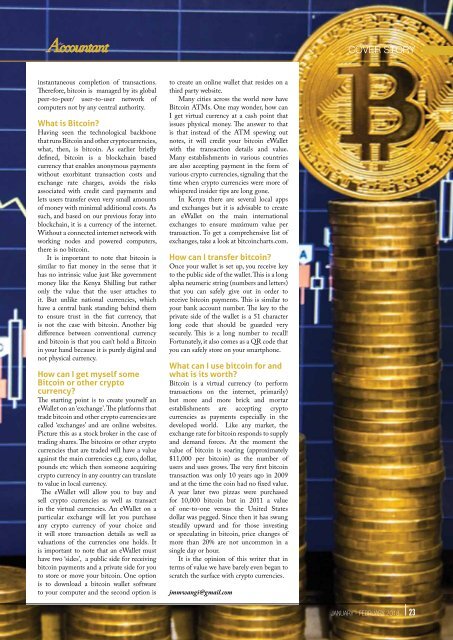The-Accountant-Jan-Feb-2018
Create successful ePaper yourself
Turn your PDF publications into a flip-book with our unique Google optimized e-Paper software.
COVER STORY<br />
instantaneous completion of transactions.<br />
<strong>The</strong>refore, bitcoin is managed by its global<br />
peer-to-peer/ user-to-user network of<br />
computers not by any central authority.<br />
What is Bitcoin?<br />
Having seen the technological backbone<br />
that runs Bitcoin and other cryptocurrencies,<br />
what, then, is bitcoin. As earlier briefly<br />
defined, bitcoin is a blockchain based<br />
currency that enables anonymous payments<br />
without exorbitant transaction costs and<br />
exchange rate charges, avoids the risks<br />
associated with credit card payments and<br />
lets users transfer even very small amounts<br />
of money with minimal additional costs. As<br />
such, and based on our previous foray into<br />
blockchain, it is a currency of the internet.<br />
Without a connected internet network with<br />
working nodes and powered computers,<br />
there is no bitcoin.<br />
It is important to note that bitcoin is<br />
similar to fiat money in the sense that it<br />
has no intrinsic value just like government<br />
money like the Kenya Shilling but rather<br />
only the value that the user attaches to<br />
it. But unlike national currencies, which<br />
have a central bank standing behind them<br />
to ensure trust in the fiat currency, that<br />
is not the case with bitcoin. Another big<br />
difference between conventional currency<br />
and bitcoin is that you can’t hold a Bitcoin<br />
in your hand because it is purely digital and<br />
not physical currency.<br />
How can I get myself some<br />
Bitcoin or other crypto<br />
currency?<br />
<strong>The</strong> starting point is to create yourself an<br />
eWallet on an ‘exchange’. <strong>The</strong> platforms that<br />
trade bitcoin and other crypto currencies are<br />
called ‘exchanges’ and are online websites.<br />
Picture this as a stock broker in the case of<br />
trading shares. <strong>The</strong> bitcoins or other crypto<br />
currencies that are traded will have a value<br />
against the main currencies e.g. euro, dollar,<br />
pounds etc which then someone acquiring<br />
crypto currency in any country can translate<br />
to value in local currency.<br />
<strong>The</strong> eWallet will allow you to buy and<br />
sell crypto currencies as well as transact<br />
in the virtual currencies. An eWallet on a<br />
particular exchange will let you purchase<br />
any crypto currency of your choice and<br />
it will store transaction details as well as<br />
valuations of the currencies one holds. It<br />
is important to note that an eWallet must<br />
have two ‘sides’, a public side for receiving<br />
bitcoin payments and a private side for you<br />
to store or move your bitcoin. One option<br />
is to download a bitcoin wallet software<br />
to your computer and the second option is<br />
to create an online wallet that resides on a<br />
third party website.<br />
Many cities across the world now have<br />
Bitcoin ATMs. One may wonder, how can<br />
I get virtual currency at a cash point that<br />
issues physical money. <strong>The</strong> answer to that<br />
is that instead of the ATM spewing out<br />
notes, it will credit your bitcoin eWallet<br />
with the transaction details and value.<br />
Many establishments in various countries<br />
are also accepting payment in the form of<br />
various crypto currencies, signaling that the<br />
time when crypto currencies were more of<br />
whispered insider tips are long gone.<br />
In Kenya there are several local apps<br />
and exchanges but it is advisable to create<br />
an eWallet on the main international<br />
exchanges to ensure maximum value per<br />
transaction. To get a comprehensive list of<br />
exchanges, take a look at bitcoincharts.com.<br />
How can I transfer bitcoin?<br />
Once your wallet is set up, you receive key<br />
to the public side of the wallet. This is a long<br />
alpha neumeric string (numbers and letters)<br />
that you can safely give out in order to<br />
receive bitcoin payments. This is similar to<br />
your bank account number. <strong>The</strong> key to the<br />
private side of the wallet is a 51 character<br />
long code that should be guarded very<br />
securely. This is a long number to recall!<br />
Fortunately, it also comes as a QR code that<br />
you can safely store on your smartphone.<br />
What can I use bitcoin for and<br />
what is its worth?<br />
Bitcoin is a virtual currency (to perform<br />
transactions on the internet, primarily)<br />
but more and more brick and mortar<br />
establishments are accepting crypto<br />
currencies as payments especially in the<br />
developed world. Like any market, the<br />
exchange rate for bitcoin responds to supply<br />
and demand forces. At the moment the<br />
value of bitcoin is soaring (approximately<br />
$11,000 per bitcoin) as the number of<br />
users and uses grows. <strong>The</strong> very first bitcoin<br />
transaction was only 10 years ago in 2009<br />
and at the time the coin had no fixed value.<br />
A year later two pizzas were purchased<br />
for 10,000 bitcoin but in 2011 a value<br />
of one-to-one versus the United States<br />
dollar was pegged. Since then it has swung<br />
steadily upward and for those investing<br />
or speculating in bitcoin, price changes of<br />
more than 20% are not uncommon in a<br />
single day or hour.<br />
It is the opinion of this writer that in<br />
terms of value we have barely even began to<br />
scratch the surface with crypto currencies.<br />
jmmwangi@gmail.com<br />
JANUARY - FEBRUARY <strong>2018</strong> 23

















